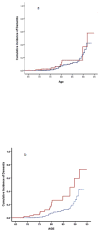Intellectual Disability, Mild Cognitive Impairment, and Risk for Dementia
- PMID: 24273589
- PMCID: PMC3834861
- DOI: 10.1111/jppi.12042
Intellectual Disability, Mild Cognitive Impairment, and Risk for Dementia
Abstract
People with intellectual disability (ID) are living longer than ever before, raising concerns about old-age associated disorders. Dementia is among the most serious of these disorders, and theories relating cognitive reserve to risk predict that older adults with ID should be particularly vulnerable. Previous estimates of relative risk for dementia associated with ID have been inconsistent, and the present analyses examined the possible influence of variation in diagnostic criteria on findings. As expected, relaxation in the stringency of case definition for adults with ID increased relative risk, underscoring the importance of developing valid criteria for defining mild cognitive impairment, early dementia, and distinguishing between the two in adults with ID. Once available, these standards will contribute to more effective evidence-based planning.
Keywords: dementia; incidence; intellectual disability; mild cognitive impairment; relative risk.
Figures

References
-
- American Psychiatric Association. Diagnostic and statistical manual of mental disorders: Fourth edition text revision, DSM-IV-TR. Arlington, VA: American Psychiatric Association; 2000.
-
- American Psychiatric Association. Diagnostic and statistical manual of mental disorders. 5. Arlington, VA: American Psychiatric Association; 2013.
-
- Ball S, Holland A, Hon J, Huppert F, Treppner P, Watson P. Personality and behaviour changes mark the early stages of Alzheimer’s disease in adults with Down’s syndrome: findings from a prospective population-based study. International Journal of Geriatric Psychiatry. 2006;21:661–673. - PubMed
-
- Ball S, Holland A, Treppner P, Watson P, Huppert F. Executive dysfunction and its association with personality and behaviour changes in the development of Alzheimer’s disease in adults with Down syndrome and mild to moderate learning disabilities. British Journal of Clinical Psychology. 2008;47:1–29. - PubMed
Grants and funding
LinkOut - more resources
Full Text Sources
Other Literature Sources
Research Materials
